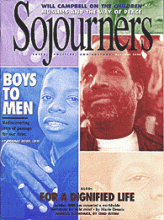I have a confession to make: After viewing Robert Duvalls The Apostle, I wanted to returnfor the first time in nearly 20 yearsto the pentecostal church. I realized I miss preaching that overflows with gospel clichés and the strange howl of people overcome with the Holy Ghost. I miss the big hair, the big cars, and the big extravaganzas put on to "win back our city for Christ." For the first time in a long time, I miss feeling the completely otherworldly sensation of being a born-again, Holy Ghost-filled believer.
Dont get me wrong, Im still a believer. But while watching The Apostle, I longed to be once again part of a culture of Christians who arent the least bit embarrassed that their neighbors think theyre nuts for yelling at God all night long.
The Apostle tells the story of Eulis "Sonny" Dewey, a traveling missionary and the pastor of a successful church in Fort Worth, Texas. While Sonny is singularly focused on winning souls for Christ, he is never one dimensional. Neither really good nor really bad, he is perhaps a lot more like us than we care to admit.
After catching his wife (played by Farrah Fawcett) in an affair with another minister, Sonnyfilled with "spirits" of the distilled varietybusts up his brother in Christ with a bat. The preacher then hits the road, stripping himself of all the vestiges of his former life and baptizing himself as Gods apostle. Now calling himself "the Apostle E.F.," Sonny ends up in a tiny town in Louisiana, where he throws himself into building a church.
Read the Full Article
